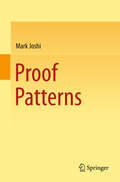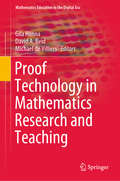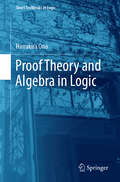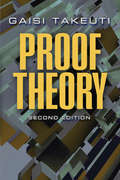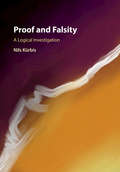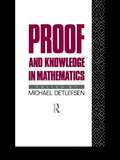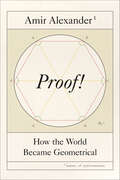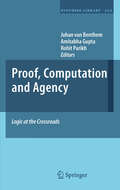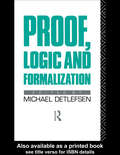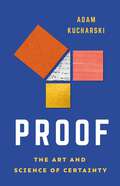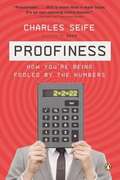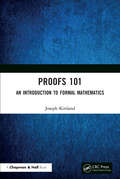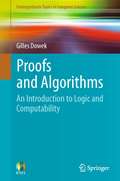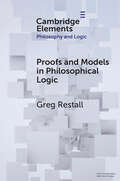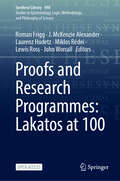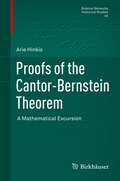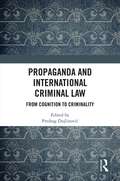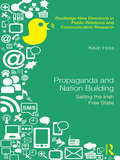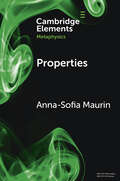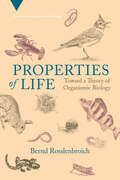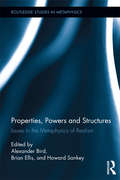- Table View
- List View
Proof Patterns
by Mark JoshiThis innovative textbook introduces a new pattern-based approach to learning proof methods in the mathematical sciences. Readers will discover techniques that will enable them to learn new proofs across different areas of pure mathematics with ease. The patterns in proofs from diverse fields such as algebra, analysis, topology and number theory are explored. Specific topics examined include game theory, combinatorics and Euclidean geometry, enabling a broad familiarity. The author, an experienced lecturer and researcher renowned for his innovative view and intuitive style, illuminates a wide range of techniques and examples from duplicating the cube to triangulating polygons to the infinitude of primes to the fundamental theorem of algebra. Intended as a companion for undergraduate students, this text is an essential addition to every aspiring mathematician's toolkit.
Proof Technology in Mathematics Research and Teaching (Mathematics Education in the Digital Era #14)
by Gila Hanna Michael De Villiers David A. ReidThis book presents chapters exploring the most recent developments in the role of technology in proving. The full range of topics related to this theme are explored, including computer proving, digital collaboration among mathematicians, mathematics teaching in schools and universities, and the use of the internet as a site of proof learning. Proving is sometimes thought to be the aspect of mathematical activity most resistant to the influence of technological change. While computational methods are well known to have a huge importance in applied mathematics, there is a perception that mathematicians seeking to derive new mathematical results are unaffected by the digital era. The reality is quite different. Digital technologies have transformed how mathematicians work together, how proof is taught in schools and universities, and even the nature of proof itself. Checking billions of cases in extremely large but finite sets, impossible a few decades ago, has now become a standard method of proof. Distributed proving, by teams of mathematicians working independently on sections of a problem, has become very much easier as digital communication facilitates the sharing and comparison of results. Proof assistants and dynamic proof environments have influenced the verification or refutation of conjectures, and ultimately how and why proof is taught in schools. And techniques from computer science for checking the validity of programs are being used to verify mathematical proofs. Chapters in this book include not only research reports and case studies, but also theoretical essays, reviews of the state of the art in selected areas, and historical studies. The authors are experts in the field.
Proof Theory and Algebra in Logic (Short Textbooks in Logic)
by Hiroakira OnoThis book offers a concise introduction to both proof-theory and algebraic methods, the core of the syntactic and semantic study of logic respectively. The importance of combining these two has been increasingly recognized in recent years. It highlights the contrasts between the deep, concrete results using the former and the general, abstract ones using the latter. Covering modal logics, many-valued logics, superintuitionistic and substructural logics, together with their algebraic semantics, the book also provides an introduction to nonclassical logic for undergraduate or graduate level courses.The book is divided into two parts: Proof Theory in Part I and Algebra in Logic in Part II. Part I presents sequent systems and discusses cut elimination and its applications in detail. It also provides simplified proof of cut elimination, making the topic more accessible. The last chapter of Part I is devoted to clarification of the classes of logics that are discussed in the second part. Part II focuses on algebraic semantics for these logics. At the same time, it is a gentle introduction to the basics of algebraic logic and universal algebra with many examples of their applications in logic. Part II can be read independently of Part I, with only minimum knowledge required, and as such is suitable as a textbook for short introductory courses on algebra in logic.
Proof Theory: Second Edition (Dover Books on Mathematics #Volume 81)
by Gaisi TakeutiFocusing on Gentzen-type proof theory, this volume presents a detailed overview of creative works by author Gaisi Takeuti and other twentieth-century logicians. The text explores applications of proof theory to logic as well as other areas of mathematics. Suitable for advanced undergraduates and graduate students of mathematics, this long-out-of-print monograph forms a cornerstone for any library in mathematical logic and related topics.The three-part treatment begins with an exploration of first order systems, including a treatment of predicate calculus involving Gentzen's cut-elimination theorem and the theory of natural numbers in terms of Gödel's incompleteness theorem and Gentzen's consistency proof. The second part, which considers second order and finite order systems, covers simple type theory and infinitary logic. The final chapters address consistency problems with an examination of consistency proofs and their applications.
Proof and Falsity: A Logical Investigation
by Nils KürbisThis book argues that the meaning of negation, perhaps the most important logical constant, cannot be defined within the framework of the most comprehensive theory of proof-theoretic semantics, as formulated in the influential work of Michael Dummett and Dag Prawitz. Nils Kürbis examines three approaches that have attempted to solve the problem - defining negation in terms of metaphysical incompatibility; treating negation as an undefinable primitive; and defining negation in terms of a speech act of denial - and concludes that they cannot adequately do so. He argues that whereas proof-theoretic semantics usually only appeals to a notion of truth, it also needs to appeal to a notion of falsity, and proposes a system of natural deduction in which both are incorporated. Offering new perspectives on negation, denial and falsity, his book will be important for readers working on logic, metaphysics and the philosophy of language.
Proof and Knowledge in Mathematics
by Michael DetlefsenThese questions arise from any attempt to discover an epistemology for mathematics. This collection of essays considers various questions concerning the nature of justification in mathematics and possible sources of that justification. Among these are the question of whether mathematical justification is a priori or a posteriori in character, whether logical and mathematical differ, and if formalization plays a significant role in mathematical justification,
Proof!: How the World Became Geometrical
by Amir AlexanderA “lucid and convincingly argued” narrative of how ancient geometric principles continue to shape the contemporary world (Publishers Weekly).On a cloudy day in 1413, a balding young man stood at the entrance to the Cathedral of Florence, facing the ancient Baptistery across the piazza. As puzzled passers-by looked on, he raised a small painting to his face, then held a mirror in front of the painting. Few at the time understood what he was up to; even he barely had an inkling of what was at stake. But on that day, the master craftsman and engineer Filippo Brunelleschi would prove that the world and everything within it was governed by the ancient science of geometry.In Proof!, the award-winning historian Amir Alexander traces the path of the geometrical vision of the world as it coursed its way from the Renaissance to the present, shaping our societies, our politics, and our ideals. Geometry came to stand for a fixed and unchallengeable universal order, and kings, empire-builders, and even republican revolutionaries would rush to cast their rule as the apex of the geometrical universe. For who could doubt the right of a ruler or the legitimacy of a government that drew its power from the immutable principles of Euclidean geometry?From the elegant terraces of Versailles to the broad avenues of Washington, DC, and on to the boulevards of New Delhi and Manila, the geometrical vision was carved into the landscape of modernity. Euclid, Alexander shows, made the world as we know it possible.
Proof, Computation and Agency
by Johan Van Benthem Amitabha Gupta Rohit ParikhProof, Computation and Agency: Logic at the Crossroads provides an overview of modern logic and its relationship with other disciplines. As a highlight, several articles pursue an inspiring paradigm called 'social software', which studies patterns of social interaction using techniques from logic and computer science. The book also demonstrates how logic can join forces with game theory and social choice theory. A second main line is the logic-language-cognition connection, where the articles collected here bring several fresh perspectives. Finally, the book takes up Indian logic and its connections with epistemology and the philosophy of science, showing how these topics run naturally into each other.
Proof, Logic and Formalization
by Michael DetlefsenThe mathematical proof is the most important form of justification in mathematics. It is not, however, the only kind of justification for mathematical propositions. The existence of other forms, some of very significant strength, places a question mark over the prominence given to proof within mathematics. This collection of essays, by leading figures working within the philosophy of mathematics, is a response to the challenge of understanding the nature and role of the proof.
Proof: The Art and Science of Certainty
by Adam KucharskiAn award-winning mathematician—he "made me smile and made me feel clever" (Peter Frankopan)—shows how we prove what&’s true, and what to do when we can&’t How do we establish what we believe? And how can we be certain that what we believe is true? And how do we convince other people that it is true? For thousands of years, from the ancient Greeks to the Arabic golden age to the modern world, science has used different methods—logical, empirical, intuitive, and more—to separate fact from fiction. But it all had the same goal: find perfect evidence and be rewarded with universal truth. As mathematician Adam Kucharski shows, however, there is far more to proof than axioms, theories, and laws: when demonstrating that a new medical treatment works, persuading a jury of someone&’s guilt, or deciding whether you trust a self-driving car, the weighing up of evidence is far from simple. To discover proof, we must reach into a thicket of errors and biases and embrace uncertainty—and never more so than when existing methods fail. Spanning mathematics, science, politics, philosophy, and economics, this book offers the ultimate exploration of how we can find our way to proof—and, just as importantly, of how to go forward when supposed facts falter.
Proofiness
by Charles SeifeThe bestselling author of Zero shows how mathematical misinformation pervades-and shapes-our daily lives. According to MSNBC, having a child makes you stupid. You actually lose IQ points. Good Morning America has announced that natural blondes will be extinct within two hundred years. Pundits estimated that there were more than a million demonstrators at a tea party rally in Washington, D. C. , even though roughly sixty thousand were there. Numbers have peculiar powers-they can disarm skeptics, befuddle journalists, and hoodwink the public into believing almost anything. "Proofiness," as Charles Seife explains in this eye-opening book, is the art of using pure mathematics for impure ends, and he reminds readers that bad mathematics has a dark side. It is used to bring down beloved government officials and to appoint undeserving ones (both Democratic and Republican), to convict the innocent and acquit the guilty, to ruin our economy, and to fix the outcomes of future elections. This penetrating look at the intersection of math and society will appeal to readers of Freakonomics and the books of Malcolm Gladwell. .
Proofiness
by Charles SeifeThe bestselling author of Zero shows how mathematical misinformation pervades-and shapes-our daily lives. According to MSNBC, having a child makes you stupid. You actually lose IQ points. Good Morning America has announced that natural blondes will be extinct within two hundred years. Pundits estimated that there were more than a million demonstrators at a tea party rally in Washington, D.C., even though roughly sixty thousand were there. Numbers have peculiar powers-they can disarm skeptics, befuddle journalists, and hoodwink the public into believing almost anything. "Proofiness," as Charles Seife explains in this eye-opening book, is the art of using pure mathematics for impure ends, and he reminds readers that bad mathematics has a dark side. It is used to bring down beloved government officials and to appoint undeserving ones (both Democratic and Republican), to convict the innocent and acquit the guilty, to ruin our economy, and to fix the outcomes of future elections. This penetrating look at the intersection of math and society will appeal to readers of Freakonomics and the books of Malcolm Gladwell.
Proofs 101: An Introduction to Formal Mathematics
by Joseph KirtlandProofs 101: An Introduction to Formal Mathematics serves as an introduction to proofs for mathematics majors who have completed the calculus sequence (at least Calculus I and II) and a first course in linear algebra. The book prepares students for the proofs they will need to analyze and write the axiomatic nature of mathematics and the rigors of upper-level mathematics courses. Basic number theory, relations, functions, cardinality, and set theory will provide the material for the proofs and lay the foundation for a deeper understanding of mathematics, which students will need to carry with them throughout their future studies. Features Designed to be teachable across a single semester Suitable as an undergraduate textbook for Introduction to Proofs or Transition to Advanced Mathematics courses Offers a balanced variety of easy, moderate, and difficult exercises
Proofs and Algorithms
by Gilles DowekLogic is a branch of philosophy, mathematics and computer science. It studies the required methods to determine whether a statement is true, such as reasoning and computation. Proofs and Algorithms: Introduction to Logic and Computability is an introduction to the fundamental concepts of contemporary logic - those of a proof, a computable function, a model and a set. It presents a series of results, both positive and negative, - Church's undecidability theorem, Gödel's incompleteness theorem, the theorem asserting the semi-decidability of provability - that have profoundly changed our vision of reasoning, computation, and finally truth itself. Designed for undergraduate students, this book presents all that philosophers, mathematicians and computer scientists should know about logic.
Proofs and Models in Philosophical Logic (Elements in Philosophy and Logic)
by Greg RestallThis Element is an introduction to recent work proofs and models in philosophical logic, with a focus on the semantic paradoxes the sorites paradox. It introduces and motivates different proof systems and different kinds of models for a range of logics, including classical logic, intuitionistic logic, a range of three-valued and four-valued logics, and substructural logics. It also compares and contrasts the different approaches to substructural treatments of the paradox, showing how the structural rules of contraction, cut and identity feature in paradoxical derivations. It then introduces model theoretic treatments of the paradoxes, including a simple fixed-point model construction which generates three-valued models for theories of truth, which can provide models for a range of different non-classical logics. The Element closes with a discussion of the relationship between proofs and models, arguing that both have their place in the philosophers' and logicians' toolkits.
Proofs and Refutations
by John Worrall Elie Zahar Imre Lakatos Lakatos Imre Zahar ElieImre Lakatos's Proofs and Refutations is an enduring classic, which has never lost its relevance. Taking the form of a dialogue between a teacher and some students, the book considers various solutions to mathematical problems and, in the process, raises important questions about the nature of mathematical discovery and methodology. Lakatos shows that mathematics grows through a process of improvement by attempts at proofs and critiques of these attempts, and his work continues to inspire mathematicians and philosophers aspiring to develop a philosophy of mathematics that accounts for both the static and the dynamic complexity of mathematical practice. With a specially commissioned Preface written by Paolo Mancosu, this book has been revived for a new generation of readers.
Proofs and Refutations
by John Worrall Elie ZaharProofs and Refutations is essential reading for all those interested in the methodology, the philosophy and the history of mathematics. Much of the book takes the form of a discussion between a teacher and his students. They propose various solutions to some mathematical problems and investigate the strengths and weaknesses of these solutions. Their discussion (which mirrors certain real developments in the history of mathematics) raises some philosophical problems and some problems about the nature of mathematical discovery or creativity. Imre Lakatos is concerned throughout to combat the classical picture of mathematical development as a steady accumulation of established truths. He shows that mathematics grows instead through a richer, more dramatic process of the successive improvement of creative hypotheses by attempts to 'prove' them and by criticism of these attempts: the logic of proofs and refutations.
Proofs and Research Programmes: Lakatos at 100 (Synthese Library #498)
by John Worrall Roman Frigg J. McKenzie Alexander Lewis Ross Laurenz Hudetz Miklos RédeiThis open access book offers new insights into issues raised in philosophy of mathematics and in philosophy of science by Imre Lakatos. Lakatos was one of the most significant philosophers of the 20th Century, and his ideas remain important and relevant today. November 2022 saw the centenary of Lakatos&’s birth, and the event was marked by an international conference held at the LSE – where Lakatos made his career after he had emigrated from Hungary to England. This volume consists of a selection of papers presented at the conference along with two additional contributions to debates about Lakatos&’s continuing influence and importance.
Proofs of the Cantor-Bernstein Theorem
by Arie HinkisThis book offers an excursion through the developmental area of research mathematics. It presents some 40 papers, published between the 1870s and the 1970s, on proofs of the Cantor-Bernstein theorem and the related Bernstein division theorem. While the emphasis is placed on providing accurate proofs, similar to the originals, the discussion is broadened to include aspects that pertain to the methodology of the development of mathematics and to the philosophy of mathematics. Works of prominent mathematicians and logicians are reviewed, including Cantor, Dedekind, Schröder, Bernstein, Borel, Zermelo, Poincaré, Russell, Peano, the Königs, Hausdorff, Sierpinski, Tarski, Banach, Brouwer and several others mainly of the Polish and the Dutch schools. In its attempt to present a diachronic narrative of one mathematical topic, the book resembles Lakatos' celebrated book Proofs and Refutations. Indeed, some of the observations made by Lakatos are corroborated herein. The analogy between the two books is clearly anything but superficial, as the present book also offers new theoretical insights into the methodology of the development of mathematics (proof-processing), with implications for the historiography of mathematics.
Propaganda and International Criminal Law: From Cognition to Criminality
by Predrag DojčinovićThis book addresses the conceptual and evidentiary issues relating to the treatment of propaganda in international criminal law. Bringing together an interdisciplinary range of scholars, researchers and legal practitioners from Africa, Australia, Europe and the United States, the book provides an in-depth analysis of the nature, position and role of the concept of propaganda in mass atrocity crimes trials. A sequel to the earlier Propaganda, War Crimes Trials and International Law: From Speakers’ Corner to War Crimes (Routledge, 2011) this book is the first to synthesize the knowledge, procedures and methods of international criminal law with the social cognitive sciences. Including a comprehensive overview of the most relevant case law, jurisprudence and scientific studies, the book also offers a series of practical insights and strategies for both academics and legal professionals. An invaluable resource for those working in the area of international criminal law, this book will also be of interest to academics, practitioners and students with relevant interests in legal theory, politics, linguistics and psychology.
Propaganda and Nation Building: Selling the Irish Free State (Routledge New Directions in PR & Communication Research)
by Kevin HoraThis book examines the origins of Ireland in its first independent incarnation, the Irish Free State (1922-1937). It explores how contemporary public relations and propaganda techniques were used to construct an identity for this new state – a state which after enduring seven years of insurrection and civil war, became one of the most stable democracies in Europe. This stability, the book argues, was constructed not solely through policies enacted by governments, but through the construction of a Gaelic, Catholic and Celtic national identity. By shifting the perspective to how nation building was communicated, it weaves an interdisciplinary narrative that initiates a new understanding of nation building - providing insights of increasing relevance in current world events. Avoiding a simplistic cause and effect history of public relations, the book examines the uses and effects of early public relations from a political and societal perspective and suggests that while governments were only modestly successful in their varied propaganda efforts, cumulatively they facilitated a transition from violence to peace. This will be of interest to researchers and advanced students with an interest in public relations, propaganda studies, nation building and Irish studies.
Properties (Elements in Metaphysics)
by Anna-Sofia MaurinAlthough the subject matter of this Element is properties, do not expect in-depth introductions to the various views on properties 'on the market'. Instead, here that subject matter is treated meta-philosophically. Rather than ask and try to answer a question like do properties exist? this Element asks what reasons one might have for thinking that properties exist (what problem properties, if they exist, are there to solve), what counts as solving that (or those) problems (including what counts as 'a property'), as well as how we ought to proceed when trying to find out if properties exist (by which method this ought to be decided). As it turns out, these questions and their answers are all intricately intertwined. Theory comparison and theory evaluation is in other words (and perhaps not that surprisingly) tricky. Do properties exist? After reading this Element all we can say is therefore this: that depends.
Properties and Propositions: The Metaphysics of Higher-Order Logic
by Robert TruemanThis book articulates and defends Fregean realism, a theory of properties based on Frege's insight that properties are not objects, but rather the satisfaction conditions of predicates. Robert Trueman argues that this approach is the key not only to dissolving a host of longstanding metaphysical puzzles, such as Bradley's Regress and the Problem of Universals, but also to understanding the relationship between states of affairs, propositions, and the truth conditions of sentences. Fregean realism, Trueman suggests, ultimately leads to a version of the identity theory of truth, the theory that true propositions are identical to obtaining states of affairs. In other words, the identity theory collapses the gap between mind and world. This book will be of interest to anyone working in logic, metaphysics, the philosophy of language or the philosophy of mind.
Properties of Life: Toward a Theory of Organismic Biology (Vienna Series in Theoretical Biology)
by Bernd RosslenbroichA coherent and comprehensive theory of life that synthesizes the specific properties of living organisms.Despite continued advances, science has until now struggled to describe the specific properties that define a living being. By synthesizing several aspects of organismic biology and contemporary science, Properties of Life by Bernd Rosslenbroich generates a coherent concept of the singular quality of being alive—a concept that provides a crucial foundation for scientists, farmers, and medical practitioners and helps explain how we all interact with the world around us and within ourselves.Is an organism an aggregate of parts or an integrated system with agency? Is it a passive stimulus-response machine or a being equipped with subjectivity and consciousness? Rosslenbroich argues that the way people in different fields understand life determines their assumptions about organic function and behavior. In medicine, this extends to the human organism, which influences prevention, diagnosis, and treatment. Drawing attention to a long-standing but underappreciated line of thought in organismic biology, Rosslenbroich&’s original idea emphasizes the autonomy of living processes, their network characteristics, and their self-determined organization in time and structure. A timely and revelatory book, Properties of Life formulates an integrated, unified theory that remains flexible enough to accommodate future developments and resilient enough to withstand the challenges of different theoretical and disciplinary backgrounds.
Properties, Powers and Structures: Issues in the Metaphysics of Realism (Routledge Studies in Metaphysics)
by Brian Ellis Alexander Bird Howard SankeyWhile the phrase "metaphysics of science" has been used from time to time, it has only recently begun to denote a specific research area where metaphysics meets philosophy of science—and the sciences themselves. The essays in this volume demonstrate that metaphysics of science is an innovative field of research in its own right. The principle areas covered are: The modal metaphysics of properties: What is the essential nature of natural properties? Are all properties essentially categorical? Are they all essentially dispositions, or are some categorical and others dispositional? Realism in mathematics and its relation to science: What does a naturalistic commitment of scientific realism tell us about our commitments to mathematical entities? Can this question be framed in something other than a Quinean philosophy? Dispositions and their relation to causation: Can we generate an account of causation that takes dispositionality as fundamental? And if we take dispositions as fundamental (and hence not having a categorical causal basis), what is the ontological ground of dispositions? Pandispositionalism: Could all properties be dispositional in nature? Natural kinds: Are there natural kinds, and if so what account of their nature should we give? For example, do they have essences? Here we consider how these issues may be illuminated by considering examples from reals science, in particular biochemistry and neurobiology.
